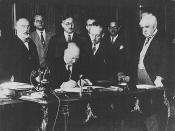Following the roaring 1920's, the 1930's plagued Canada with some of the most devastating hardships that Canada has ever experienced. The Roaring Twenties had come to a complete and abrupt halt when the stock market crashed on October 24,1929 in New York, Toronto and Montreal. The market crashed because the stocks in the New York exchange were over valued. Previous signs of a recession had been ignored therefore thousands of business' had gone bankrupt literally over night, due to the depreciation in material value. Gold Exchange that was adopted in the mid thirties was sometimes criticized as one of the factors that contributed to the length and severity of Canada's Great Depression. The depression had occurred at the worst time possible. During the 1930's Canada was plagued with a nation wide drought. The prairies were especially susceptible to the drought. To add to the problems a misguided government was in control.
Business and industry saw the worst of the economic depression. Many business' and industry ceased to exist following the depression. The entire nation felt these affects, although the provinces experienced them in different ways. The Great Depression was not only detrimental to the business and industry, it affected the society deeply in their own homes. Canada's Great Depression of the 1930's was one of the largest disappointments in Canadian history.
The 1930's in Canada experienced torturing weather. This time was also known as the "Dirty Thirties". Throughout this time Canada experienced extremely dry weather, this plague however affected the prairie provinces more severely than any other area of Canada. There was a 5-7 year period in the prairies where the prairie provinces received next to no precipitation (Desmond, 1996). Hot winds dried up everything, and began blowing away crop soil. One man who lived during this time described...


